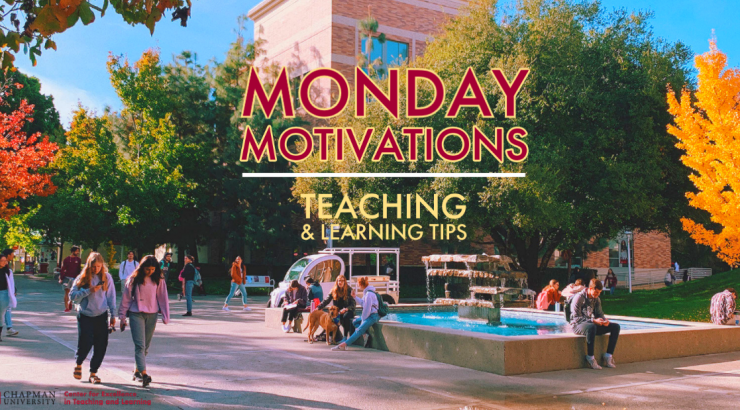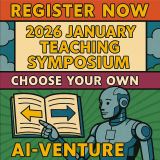
Teaching Tip for the Week of June 26, 2023
June 22, 2023
This summer, the CETL will be presenting one tip per week, to provide a more in-depth discussion of evidence-based teaching practices. If there are specific topics you would like to see CETL explore, please let us know! We also welcome guest posts from faculty who have a teaching tip they would like to share with their colleagues.
Academic Integrity: Is it a Trait or a State?

In 2012, Kenyan runner Abel Mutai was just 10 meters from the finish line when he stopped running, confused by the signage, thinking he had already completed the race. Right behind him was a Spanish athlete, Ivan Fernandez, who caught up to him and instead of passing him, he guided Mutai to victory. When asked, “Why did you do that?” Ivan replied, “He was the rightful winner.” As the story goes, a journalist insisted, “But why did you let the Kenyan win?” Ivan replied, “I didn’t let him win, he was going to win. He created a gap that I couldn’t have closed if he hadn’t made a mistake.” A journalist later replied, “But you could have won!” And with much character Ivan replied, “But what would be the merit of my victory? What would be the honor of that medal?” (International Fair Play Committee, 2015).
Ivan’s explanation reveals that his actions were founded upon a long-term character trait, as opposed to a short-term situation or temporary state. People would likely describe Ivan as a person of integrity, driven by a set of moral and ethical principles that, even when presented with the opportunity to cheat his way to the winner’s spot, led him to do the right thing. Indeed, values such as honesty, fairness, and accepting personal responsibility are foundational to integrity in life and in academia.
Since the debut of ChatGPT (an artificial intelligence tool used to create human-like conversational dialogue), discussions about academic honesty once again echo through the halls of higher education. Among professors, the greatest concern is preventing academic misconduct (e.g., cheating, plagiarism, collusion) and maintaining academic integrity. But what motivates students to cheat and/or turn in AI-generated work as their own in the first place? In the recent “Student Voice” survey conducted by Inside Higher Ed and College Pulse, three-quarters of the college students surveyed (n=2000) identify pressure to do well, lack of preparation for exams, and heavy or unrealistic workloads as the most common reasons cited (see Student Views on Cheating).
According to Arthur Chickering’s student development theory, college experiences can play a significant role in the ongoing development of young people. He theorized seven stages that students must pass through during their college years, one of which results in the development of integrity… “the ability for students to personalize humanizing values and apply them to their own behavior” (Chickering, 1969). So, as we wrestle with how to respond to students’ “lack of academic integrity,” it’s important to remember that college students are still on a developmental journey. Acting with integrity comes with time and experience.
Establishing policy on the use of AI tools such as ChatGPT requires a good deal of honest (and sometimes difficult) dialogue, active listening, accurate information, openness, and compromise among colleagues. Yet even with a policy, we still need to determine how best to help students understand the concept and value of [academic] integrity, as well as ways to mitigate academic misconduct and/or the misuse of these tools. As you work to identify your own stance and the impact of AI in your discipline/course, ask yourself:
- What experiences, in and out of the classroom, do students need to develop and value academic integrity?
- Who in the campus community is responsible to ensure students understand the fundamental values of academic integrity?
- Am I teaching the “whole” student? Does my teaching extend beyond the development of students’ cognitive (i.e., knowledge and thinking) and psychomotor (i.e., skills development) domains to include the affective domain (i.e., emotions/feelings, beliefs, attitudes, and values)?
- What is the quality and quantity of evidence I am collecting to assess course learning outcomes? Are my assessments authentic, reflecting how the newly acquired knowledge and skills are applied in the field/real-world? Do my students have multiple and varied opportunities to demonstrate their learning across the term (i.e., low-, medium-, and higher-stakes assessments) or just a couple of high-stakes exams and/or papers/projects?
If you are interested in this topic, please join us for our upcoming Conference on Innovative Teaching and Student Success to engage in dialogue with your colleagues about academic integrity, balancing rigor and compassion, the “hidden curriculum,” and other strategies for supporting students in and out of the classroom.
Interested in exploring any of these ideas further or discussing how you might implement them in your own teaching practices? Is there a tip you’ve tried that you would like to share with colleagues? Contact CETL or schedule a consultation to continue the conversation.


